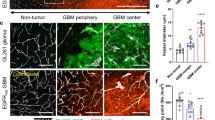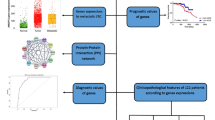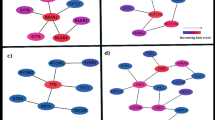Abstract
Angiogenesis leads to the formation of blood vessels from pre-existing ones, allowing tumor growth. Vascular endothelial growth factor (VEGF) and Angiopoietins (Ang-1, Ang-2) have a pivotal role in tumor angiogenesis but few data regarding their role in hereditary breast cancer are available. The aim of the present study was to analyze Ang-1, Ang-2, tyrosine-protein kinase receptor Tie2 and VEGF expression and their correlation in a cohort of familial and sporadic breast cancers in order to verify whether the presence of germline mutations in BRCA may have a role in tumor microenvironment regulation. Tumor samples from a cohort of 41 patients with a first diagnosis and a family history of breast cancer and 19 patients with sporadic breast cancers were enrolled. The expression of Tie2, Ang-1, Ang-2 and VEGF were analyzed by quantitative real-time PCR. Patients harboring BRCA mutations had higher levels of Ang-1 (P=0.05), Ang-2 (P=0.02) and VEGF (P=0.04) mRNA compared with those without BRCA mutations (BRCAX). The same was observed in triple-negative breast cancer (TNBC). Moreover, a positive correlation between Ang-2 and VEGF was found in both the familial breast cancer group (BRCA carriers: r=0.83; P<0.0001 and BRCAX: r=0.58; P=0.008) and in TNBC (r=0.62; P=0.007). The higher levels of Ang-1, Ang-2 and VEGF mRNA found in BRCA carriers and TNBCs suggest that they could be attractive angiogenic therapeutic targets in these breast cancers.
Similar content being viewed by others
Log in or create a free account to read this content
Gain free access to this article, as well as selected content from this journal and more on nature.com
or
References
Yancopoulos GD, Davis S, Gale NW, Rudge JS, Wiegand SJ, Holash J : Vascular-specific growth factors and blood vessel formation. Nature 2000; 407: 242–248.
Abdullah SE, Perez-Soler R : Mechanisms of resistance to vascular endothelial growth factor blockade. Cancer 2011; 118: 3455–3467.
Huang H, Bhat A, Woodnutt G, Lappe R : Targeting the ANGPT-TIE2 pathway in malignancy. Nat Rev Cancer 2010; 10: 575–585.
Fukuhara S, Sako K, Noda K, Zhang J, Minami M, Mochizuki N : Angiopoietin-1/Tie2 receptor signaling in vascular quiescence and angiogenesis. Histol Histopathol 2010; 25: 387–396.
Staton CA, Hoh L, Baldwin A et al: Angiopoietins 1 and 2 and Tie-2 receptor expression in human ductal breast disease. Histopathology 2011; 59: 256–263.
Tsutsui S, Inoue H, Yasuda K et al: Angiopoietin 2 expression in invasive ductal carcinoma of the breast: its relationship to the VEGF expression and microvessel density. Breast Cancer Res Treat 2006; 98: 261–266.
Vassilopoulos A, Deng CX, Chavakis T : Crosstalk between the DNA damage response, histone modifications and neovascularisation. Int J Biochem Cell Biol 2010; 42: 193–197.
Kawai H, Li H, Chun P, Avraham S, Avraham HK : Direct interaction between BRCA1 and the estrogen receptor regulates vascular endothelial growth factor (VEGF) transcription and secretion in breast cancer cells. Oncogene 2002; 21: 7730–7739.
Furuta S, Wang JM, Wei S et al: Removal of BRCA1/CtIP/ZBRK1 repressor complex on ANG1 promoter leads to accelerated mammary tumor growth contributed by prominent vasculature. Cancer Cell 2006; 10: 13–24.
Eerola H, Aittomaki K, Asko-Seljavaara S, Nevanlinna H, von Smitten K : Hereditary breast cancer and handling of patients at risk. Scand J Surg 2002; 91: 280–287.
Heerma van Voss MR, van der Groep P, Bart J, van der Wall E, van Diest PJ : Lympho-vascular invasion in BRCA related breast cancer compared to sporadic controls. BMC Cancer 2010; 10: 145.
Davis JD, Lin SY : DNA damage and breast cancer. World J Clin Oncol 2011; 2: 329–338.
Tommasi S, Crapolicchio A, Lacalamita R et al: BRCA1 mutations and polymorphisms in a hospital-based consecutive series of breast cancer patients from Apulia, Italy. Mutat Res 2005; 578: 395–405.
Munoz-Chapuli R : Evolution of angiogenesis. Int J Dev Biol 2011; 55: 345–351.
Kang HJ, Kim HJ, Rih JK et al: BRCA1 plays a role in the hypoxic response by regulating HIF-1alpha stability and by modulating vascular endothelial growth factor expression. J Biol Chem 2006; 281: 13047–13056.
Yan M, Rayoo M, Takano EA, Fox SB : BRCA1 tumours correlate with a HIF-1alpha phenotype and have a poor prognosis through modulation of hydroxylase enzyme profile expression. Br J Cancer 2009; 101: 1168–1174.
Zhang L, Yang N, Park JW et al: Tumor-derived vascular endothelial growth factor up-regulates angiopoietin-2 in host endothelium and destabilizes host vasculature, supporting angiogenesis in ovarian cancer. Cancer Res 2003; 63: 3403–3412.
Moon WS, Rhyu KH, Kang MJ et al: Overexpression of VEGF and angiopoietin 2: a key to high vascularity of hepatocellular carcinoma? Mod Pathol 2003; 16: 552–557.
Sun XD, Liu XE, Wu JM, Cai XJ, Mou YP, Li JD : Expression and significance of angiopoietin-2 in gastric cancer. World J Gastroenterol 2004; 10: 1382–1385.
Metheny-Barlow LJ, Li LY : The enigmatic role of angiopoietin-1 in tumor angiogenesis. Cell Res 2003; 13: 309–317.
Maisonpierre PC, Suri C, Jones PF et al: Angiopoietin-2, a natural antagonist for Tie2 that disrupts in vivo angiogenesis. Science 1997; 277: 55–60.
Augustin HG, Koh GY, Thurston G, Alitalo K : Control of vascular morphogenesis and homeostasis through the angiopoietin-Tie system. Nat Rev Mol Cell Biol 2009; 10: 165–177.
Perou CM : Molecular stratification of triple-negative breast cancers. Oncologist 2011; 16 (Suppl 1): 61–70.
Linderholm BK, Hellborg H, Johansson U et al: Significantly higher levels of vascular endothelial growth factor (VEGF) and shorter survival times for patients with primary operable triple-negative breast cancer. Ann Oncol 2009; 20: 1639–1646.
Anargyrou K, Terpos E, Vassilakopoulos TP et al: Normalization of the serum angiopoietin-1 to angiopoietin-2 ratio reflects response in refractory/resistant multiple myeloma patients treated with bortezomib. Haematologica 2008; 93: 451–454.
Lind AJ, Wikstrom P, Granfors T, Egevad L, Stattin P, Bergh A : Angiopoietin 2 expression is related to histological grade, vascular density, metastases, and outcome in prostate cancer. Prostate 2005; 62: 394–399.
Maffei R, Martinelli S, Santachiara R et al: Angiopoietin-2 plasma dosage predicts time to first treatment and overall survival in chronic lymphocytic leukemia. Blood 2010; 116: 584–592.
Sfiligoi C, de Luca A, Cascone I et al: Angiopoietin-2 expression in breast cancer correlates with lymph node invasion and short survival. Int J Cancer 2003; 103: 466–474.
Rmali KA, Watkins G, Douglas-Jones A, Mansel RE, Jiang WG : Angiopoietins lack of prognostic significance in ductal mammary carcinoma. Int Semin Surg Oncol 2007; 4: 6.
Ali SH, O'Donnell AL, Balu D et al: Estrogen receptor-alpha in the inhibition of cancer growth and angiogenesis. Cancer Res 2000; 60: 7094–7098.
Acknowledgements
We thank Caroline Oakley for manuscript revision. The study was partially funded by Progetto Strategico Regionale Puglia – APQ ‘The biotechnologies for the targeted therapy in oncology (Biotecnoter)’ and by Progetto regionale Puglia (DIEF 2007).
Author information
Authors and Affiliations
Corresponding author
Ethics declarations
Competing interests
The authors declare no conflict of interest.
Rights and permissions
About this article
Cite this article
Danza, K., Pilato, B., Lacalamita, R. et al. Angiogenetic axis angiopoietins/Tie2 and VEGF in familial breast cancer. Eur J Hum Genet 21, 824–830 (2013). https://doi.org/10.1038/ejhg.2012.273
Received:
Revised:
Accepted:
Published:
Issue date:
DOI: https://doi.org/10.1038/ejhg.2012.273
Keywords
This article is cited by
-
Usefulness of melatonin as complementary to chemotherapeutic agents at different stages of the angiogenic process
Scientific Reports (2020)
-
Matrine inhibits the development and progression of ovarian cancer by repressing cancer associated phosphorylation signaling pathways
Cell Death & Disease (2019)
-
Vascular endothelial growth factor receptor 2 (VEGFR2) correlates with long-term survival in patients with advanced high-grade serous ovarian cancer (HGSOC): a study from the Tumor Bank Ovarian Cancer (TOC) Consortium
Journal of Cancer Research and Clinical Oncology (2019)
-
Characterisation of tumour microvessel density during progression of high-grade serous ovarian cancer: clinico-pathological impact (an OCTIPS Consortium study).
British Journal of Cancer (2018)
-
Prognostic value of angiopoietin-2 in non-small cell lung cancer patients: a meta-analysis
World Journal of Surgical Oncology (2016)



